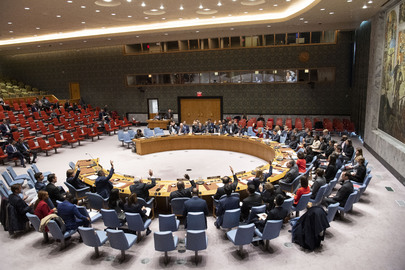Speaking in Port Sudan after a visit to Khartoum, Samantha Chattaraj, Emergency Coordinator for the UN’s World Food Programme (WFP) in Sudan, said that “vast parts of the city are destroyed. Levels of hunger and desperation are extremely high,” but she added “people remain hopeful.”
Sudan is currently the only country in the world where famine has been officially confirmed.
Half of its population is facing extreme hunger, and nearly five million children and breastfeeding mothers are severely malnourished.
Ms. Chattaraj said that in March, WFP was able to reach four million people across Sudan, the highest number since the conflict broke out over two years ago.
“This marked an important step in getting food to people who have been cut off from aid for a long time,” she added.
However, she added that “the need is far greater. With 27 areas either in famine or at high risk, the recent progress still covers only a small part of what’s required to stop the crisis.”
Destruction and hunger
In Darfur, in the west of Sudan, nearly 450,00 people who were already facing famine and horrific levels of violence have been forced to flee from El Fasher and Zamzam camps in the last few weeks, amidst an increase in fighting.
“Reports from the ground are shocking,” said Mrs Chattaraj, explaining that WFP is currently mobilising assistance to reach populations wherever they have fled to – across various parts of Darfur and Northern State.
Planning for returnees
Many people are expected to return to Khartoum in the coming months and WFP is working to strengthen its presence in the city and ensure it can deliver food regularly to those coming back.
Together with local authorities, the UN aims to provide emergency food aid to one million people in the greater Khartoum area next month.
Racing against the rain
Ahead of the rainy season set to begin in June, which will leave many routes across Darfur impracticable, WFP only has a few weeks to pre-stock food close to populations in need, Ms. Chattaraj said.
In preparation WFP is setting up mobile warehouses across Darfur to safely store food supplies and keep operations running even during the rains.
Meanwhile, around 100,000 people remain trapped in the besieged city of El Fasher.
WFP is urgently calling for more funding and safe access to areas in need so it can continue its work in what is now the world’s largest humanitarian crisis.
Source of original article: United Nations (news.un.org). Photo credit: UN. The content of this article does not necessarily reflect the views or opinion of Global Diaspora News (www.globaldiasporanews.com).
To submit your press release: (https://www.globaldiasporanews.com/pr).
To advertise on Global Diaspora News: (www.globaldiasporanews.com/ads).
Sign up to Global Diaspora News newsletter (https://www.globaldiasporanews.com/newsletter/) to start receiving updates and opportunities directly in your email inbox for free.






























